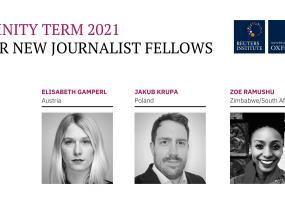UK journalists - the industry behind the headlines
10 May 2016
By Hannah Marsh
Who are the men and women behind the UK headlines, and what do they think of their industry? A new Reuters Institute report, launched at City University London on May 9, explored analysis of a survey of 700 UK journalists. Journalists in the UK, by Neil Thurman, Alessio Cornia and Jessica Kunert, launched with a presentation by Thurman followed by a panel discussion chaired by the Reuters Institute’s Director of Research Rasmus Kleis Nielsen.
“Surveys of UK journalists don’t tend to ask questions about how journalists see their roles in society, who they trust, what interests their work, how they deal with ethical questions and how they think journalism is changing,” said Thurman, as he explained why the survey had been conducted. “This report is of obvious importance to journalists and audiences in the UK, but it’s also important more broadly. Many different countries look to the UK to draw inspiration from its energetic and innovative private sector and it’s widely trusted public sector.”
Key findings presented by Thurman from the report included:
- 83 per cent of journalists in their mid to late 20s earn less than £29,000 – with 20 per cent earning less than £19,500, bringing their incomes either close to or under the ‘living wage’
- Female journalists are paid less than their male colleagues – nearly 50% of female journalists earn £2,400 or less a month compared with just a third of men
- Women are also less likely to be promoted to senior management positions. This is despite women making up 45 per cent of the industry
- Fewer journalists are entering the profession without a degree. 98 per cent of UK journalists with three or less years of experience have a bachelor’s degree and 36 per cent have a master’s degree. While this has a negative impact on social diversity, it could impact gender balance in the industry as women outnumber men on academic journalism programmes
- UK journalists are less religious than the general population – compared with 2011 national census data UK journalism has a diversity problem – and the most underrepresented ethnic group are black Britons, who make up just 0.2 per cent of the industry, despite making up 3 per cent of the general population
- 94 per cent of UK journalists are white, compared with 87 per cent of the general population
- 50 per cent of journalists in the UK now work online in some capacity – but those working exclusively online are paid less than those working in print.
- Journalists working online produce 71 per cent more news items than those who don’t
- 61 per cent of journalists said that the influence of PR has increased over the last five years, while 69 per cent said that the influence of audience research/feedback had strengthened
- Journalists are more trustful of government and other state institutions including the police and the military than the general UK population. However journalists have little trust in religious leaders and trade unions
- UK journalists are more likely to push ethical boundaries than their US colleagues; 53 per cent said it was acceptable to pay for confidential information in the public interest – compared to just 5 per cent of US journalists
- UK journalists view their most important roles as: providing information, providing accuracy, holding power to account, providing entertainment and truth telling
A panel discussion followed the presentation, featuring Michelle Stanisteet, general secretary of the NUJ, Professor Suzanne Franks of City University London and Pete Clifton, editor-in-chief, Press Association. Stanistreet labelled the low pay issue a ‘big scourge’ on the industry, the dwindling of specialist trade reporters a ‘travesty', and said that too many journalists are paying for increased workloads with their health and wellbeing. Despite the challenges, the panel agreed there was much to be optimistic about for UK journalism. “People still want to read, watch and absorb great journalism,” said Pete Clifton. “We should be optimistic.”
Journalists in the UK launched at City University London on May 9.
Download the report here
Photograph (c) Julia Massey Stewart


